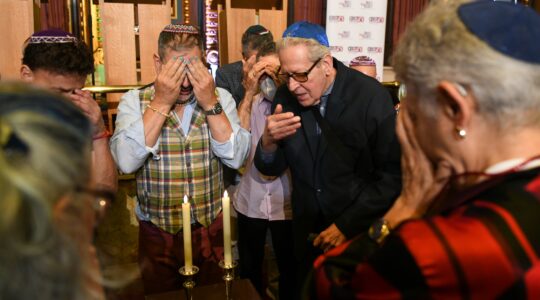The balance of power in the New York State Senate could rest on the outcome of Tuesday’s special election to fill the seat of disgraced Republican State Sen. Dean Skelos.
The 62 seats in the Senate are now split evenly between the two parties. Democratic Assemblyman Todd Kaminsky, 38, of Long Beach, L.I., and Republican candidate Christopher McGrath, 57, a personal injury lawyer from Hewlett, L.I., are vying for the seat.
Should Kaminsky win, “Democrats will control all the houses and the governorship, so this is considered a very, very important election — and Jews are the main focus of both parties,” said Larry Levy, executive dean of Hofstra University’s National Center for Urban Studies.
Levy observed that Jews who live in that senate district’s heavily Jewish Five Towns have over the years becoming increasingly politically active. And he said a growing divide has emerged between members of the Reform and Conservative movements, who generally lean toward liberal candidates, and Orthodox Jews, who are increasingly voting for Republicans.
“The Republicans are going after the Orthodox community and the Democrats are trying to get out the vote among [Conservative and Reform] voters,” he said at a panel discussion last Sunday sponsored by Stony Brook Hillel. “In the end, Jews are going to decide.”
In interviews with The Jewish Week, both candidates attempted to assure Jewish voters that they are attuned to their concerns.
“There can be no tolerance in New York for businesses that want to boycott Israel,” McGrath said, noting that the Republican-controlled State Senate has “led the way on real legislation with real teeth to fight BDS [boycott, divestment and sanctions].”
McGrath, who has never held elected office, pointed out also that the Senate “has also led the way in telling our public universities that they cannot tolerate anti-Semitic behavior on campus.”
“There is no excuse for Jewish students and professors being threatened by organizations that are publicly funded,” he said. “The Senate has led the way. Where is the [Democratic-controlled] Assembly?”
Kaminsky, who has served in the Assembly since January 2015, insisted that he is “leading the fight in the Assembly against the BDS movement.”
“We are leading the fight to ban New York State from investing state pension funds in companies that boycott Israel, and to prevent the state from giving contracts to such companies,” he said. “Until there is federal legislation on this matter, it has to be done state-by-state and New York has to be the next state that does it.”
He noted that he and Assembly Speaker Carl Heastie flew to Israel in December and visited the southern city of Sderot, which borders the Gaza Strip and has over the years has been a prime target of Hamas rockets.
“We saw what it is like to live there everyday, and it deeply affected him [Heastie],” Kaminsky said. “It takes [such a trip] to understand what Israel has been going through and that we should be celebrating Israel.”
Prior to his election, Kaminsky spent six years working as a federal prosecutor in the Eastern District of New York in Brooklyn, where he handled several public corruption cases, including that of former state Senate Majority Leader Pedro Espada Jr. and former Rep. Michael Grimm, both of whom pleaded guilty.
“Jewish voters are part of the wider community and are just as disgusted with corruption in Albany and Washington,” Kaminsky said. “When lawmakers are worried about giving contracts to their favorite crony or law firm, they are not worried about protecting our shuls, looking out for Israel and giving our children the best education possible.”
Skelos, the man they both are running to succeed, is the former State Senate majority leader. He and his son, Adam, were convicted last December of bribery, extortion and conspiracy. Skelos’ counterpart in the Assembly, former Speaker Sheldon Silver, was similarly convicted on public-corruption charges last November. Both men were expelled from office upon their conviction and both were to be sentenced this week.
Kaminsky said he has a record of “fighting for the Jewish community.” He noted that after anti-Semitic graffiti was discovered at Long Island Rail Road train stations in Lawrence and Cedarhurst, he helped to get cameras placed at those stations.
“The railroad had long-term plans to install cameras, but I made the case that they were needed now — and they have worked in those stations,” he said. “It is not rocket science to know that if you know you will be caught, you don’t do it.”
In addition, he said he helped to secure a federal grant to provide greater security at a local synagogue, and that he is working with the police and community groups to deter students from defacing the community with anti-Semitic graffiti.
Kaminsky said also that he is working to get $150,000 from the State Assembly to buy license plate readers for the Five Towns.
“If someone is on a watch list, the readers will let authorities know if that person is in the community,” he said. “It is extremely useful in combating terrorism and hate crimes — and the Five Towns is certainly a target.”
Kaminsky said he is confident the governor’s office would approve the grant, which the Nassau County Police Department would receive after it first buys as many as five readers, plus a mobile one for that would be affixed to a police car.
McGrath, who said his mother could not afford to send him to Catholic school beyond the seventh grade, said he is a “champion of education for all children.”
“The Republicans in the State Senate have led the way on issues of importance to those who send their children to private schools,” he said. “While the education tax credit did not pass in this budget because of resistance from the Assembly, there were a number of big accomplishments in the budget due to Senator [Majority Leader John] Flanagan and the Senate Republicans.”
He then cited the following accomplishments by the Senate that he said are “critical issues” for the yeshiva community:
• Some $2 million for a reconstituted Office of Religious and Independent Schools;
• Increased security grants to nonpublic schools of from $4.5 million to $15 million to pay for private security guards, training and health and safety equipment;
• Comprehensive attendance program funding that was increased to $60 million;
• Some $125 million to pay for mandated services in nonpublic schools, representing the second half of a two-year commitment of $250 million.
McGrath said he believes that establishing four two-year term limits in both the Senate and Assembly would go a long way to ending public corruption by lawmakers.
“I can’t believe the founding fathers believed lawmakers should serve 20 and 30 years,” he said.
Skelos had held his seat since 1985.
McGrath said that although Kaminsky favors changing the jobs of senator and assemblymen from part-time to full-time, he believes they should remain part-time because each session averages only 53 days.
“If you make these full-time positions, it would cost $1 billion in tax increases over 20 years, and that is not acceptable to me,” he said. “Right now, you have lawyers, doctors, farmers, teachers, business people in government. If you made these fulltime positions, you would have nothing but political hacks who grow up in political organizations and get tapped by party leaders.”
McGrath also questioned Kaminsky’s decision to vote to reelect Silver as Assembly speaker “knowing that he was the subject of a federal corruption probe. … I’m not saying Silver should have lost his job at that point, but he should not have been reelected leader.”
And he noted that Kaminsky helped defeat a proposal to eliminate the pensions of those members of the Assembly convicted of crimes.
McGrath noted that there are 41,000 more Democrats than Republicans in the district and that a high voter turnout – which is seen likely given the interest in the presidential primaries the same day — could hurt him.
Kaminsky said he is bringing his “message of honest and effective government and fighting for school funding” directly to voters in the district. He said he has knocked on thousands of doors in the last month or two.
“Skelos has held this seat since I was in the first grade,” he said. “If people want a change in government, vote for me. … I left the U.S. Attorney’s office to come to Albany where I could make a difference … [and] change the culture here. The State Senate stood in the way of a lot of reform, and my election might change that. If I win this seat, it would say to Albany that people take corruption seriously. My opponent says he does not hear a lot about corruption — I think he is living in an alternative universe.”
The New York Jewish Week brings you the stories behind the headlines, keeping you connected to Jewish life in New York. Help sustain the reporting you trust by donating today.




